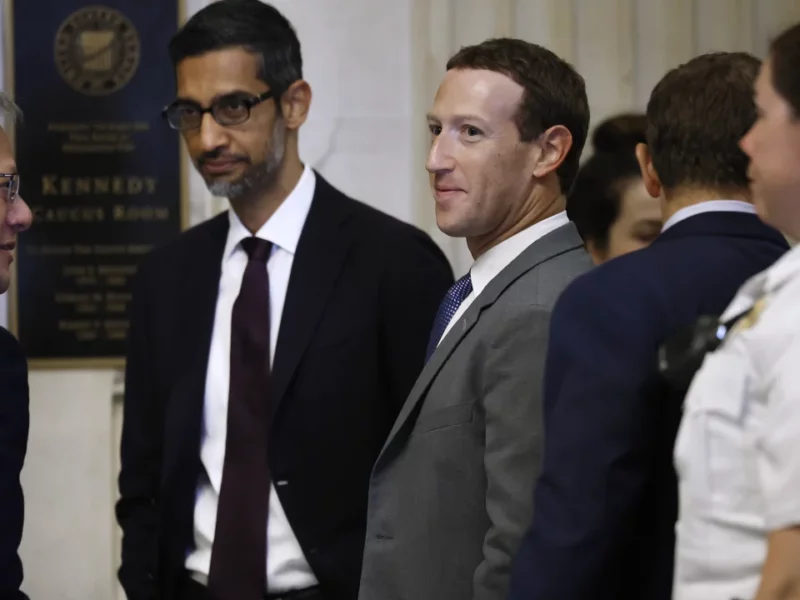Following a lengthy Senate hearing on artificial intelligence lasting three hours, Elon Musk, the leader of several tech firms, condensed the significant dangers posed by AI. He expressed, “There exists a possibility – albeit a small one – that AI could pose a threat to humanity. I consider it to be a low probability, but it is not zero,” Musk stated to journalists. He emphasized, “The repercussions of mishandling AI are profoundly serious.”
In addition, Musk remarked that this meeting “might be remembered as a crucial moment in the history of civilization for shaping its future.”
Senate Majority Leader Chuck Schumer orchestrated a gathering that brought together prominent tech CEOs, leaders from civil society, and over 60 senators. The inaugural meeting, one of nine planned sessions, sought to establish common ground as the Senate readies itself to craft regulations for the swiftly evolving artificial intelligence sector. Among the participants were CEOs from Meta, Google, OpenAI, Nvidia, and IBM.
During the meeting, all attendees showed unanimous agreement when asked if the federal government should have a role in supervising AI, as relayed by Schumer to reporters on Wednesday afternoon. Nonetheless, reaching a consensus on the specifics of this role and the details of the legislation remained a challenging task, as noted by those in attendance.
Advantages and Drawbacks
Bill Gates highlighted AI’s potential to address global hunger issues, while an anonymous participant advocated for substantial investments, possibly in the tens of billions, to support “transformational innovation” that could unleash the benefits of AI, as stated by Schumer.
The primary challenge facing Congress is to promote the advantages of AI while simultaneously mitigating the potential societal drawbacks, which encompass the risk of technology-driven discrimination, threats to national security, and, as Elon Musk, the owner of X, warned, “civilizational risk.”
Senate Majority Leader Chuck Schumer, who organized the initial session of nine, articulated, “Our demanding task is to maximize the benefits while minimizing the harm.”
Senators who participated in the meeting reported a wide spectrum of perspectives. Labor union representatives raised concerns about job displacement, while civil rights advocates emphasized the importance of an inclusive legislative process that gives a voice to the most vulnerable members of society.
A prevailing sentiment was that AI cannot be left unregulated, as expressed by Washington Democratic Senator Maria Cantwell. She referred to Microsoft CEO Satya Nadella’s statement, saying, “‘When it comes to AI, we shouldn’t be thinking about autopilot. You need to have copilots.’ So, who will oversee these activities and ensure they are carried out correctly?”
Areas where consensus was reached aligned with longstanding priorities of the tech industry, including an emphasis on increasing federal investment in research and development, as well as supporting skilled immigration and education, as mentioned by Cantwell.
However, some of the more complex questions appeared to receive limited attention during the meeting, especially the question of whether a new federal agency should be established to regulate AI. Cantwell noted that there was no substantial discussion on this matter, though some participants did suggest the idea of granting greater oversight responsibilities to the National Institute of Standards and Technology, an agency within the Commerce Department.
Elon Musk expressed his belief to reporters after the event that a dedicated agency for AI regulation is likely to be established at some point in the future.

Bill Gates, the co-founder of Microsoft, made his way to Capitol Hill, where Senate Majority Leader Chuck Schumer, a Democrat from New York, organized a private meeting involving top tech CEOs. The purpose of this gathering was to delve into the concerns and potential of artificial intelligence, as well as to explore the appropriate regulatory framework for AI. This meeting took place in Washington on September 13, 2023.
Was it a meeting of like-minded individuals?
“Schumer emphasized that when it comes to AI, we can’t afford to ignore the challenges,” as stated in prepared remarks obtained by CNN. He also underscored that this discussion represented a groundbreaking moment in Congress.
The momentum behind these discussions reflects a growing recognition among policymakers of the potential disruptions that artificial intelligence, especially generative AI like ChatGPT, could bring to various facets of business and daily life. These disruptions range from enhancing commercial productivity to posing challenges related to employment, national security, and intellectual property.
High-profile attendees started arriving shortly before 10 a.m., with Meta CEO Mark Zuckerberg engaging in a conversation with Nvidia CEO Jensen Huang outside the Senate Russell office building’s Kennedy Caucus Room. Google CEO Sundar Pichai was seen in discussion with Delaware Democratic Senator Chris Coons, while Elon Musk, the owner of X, made a quick entrance, acknowledging the crowd with a brief wave as he passed a throng of cameras. Inside, Musk and Zuckerberg were seated at opposite ends of the room, marking what is likely their first face-to-face encounter since their playful challenge to a cage fight several months ago.

Elon Musk, the CEO of X (formerly known as Twitter), and Alex Karp, the CEO of software firm Palantir Technologies, were observed taking their seats as Senate Majority Leader Chuck Schumer, a Democrat from New York, brought together a confidential meeting of prominent tech CEOs. The purpose of this closed-door session was to delve into the concerns and potential challenges related to artificial intelligence, as well as to explore the appropriate regulatory approach. This gathering took place at the Capitol in Washington on September 13, 2023.
The session held at the US Capitol in Washington represented a notable milestone for the tech industry, granting it a substantial opportunity to shape the way lawmakers formulate regulations that may govern artificial intelligence.
Several companies, including Google, IBM, Microsoft, and OpenAI, have already presented detailed proposals in the form of white papers and blog posts. These documents outline comprehensive frameworks for oversight, testing, and transparency in AI development and deployment.
During the meeting, IBM’s CEO, Arvind Krishna, argued that US policy should focus on regulating the potentially risky applications of AI, rather than solely concentrating on the algorithms themselves. He emphasized the need for regulations to consider the specific context in which AI is employed, as indicated in his prepared remarks.
The call for regulation is growing louder.
Tech executives like OpenAI CEO Sam Altman have impressed some senators by actively advocating for new regulations in the early stages of the AI industry. This proactive stance is seen as a notable departure from the social media industry’s resistance to regulation.
Clement Delangue, the co-founder and CEO of AI company Hugging Face, expressed some reservations about the guest list for Schumer’s meeting, noting that it might not be fully representative and inclusive. Nevertheless, he pledged to provide insights from a wide range of community members, particularly on topics related to openness, transparency, inclusiveness, and the distribution of power.
Civil society organizations have raised concerns about the potential dangers of AI, including the possibility of poorly trained algorithms unintentionally discriminating against minority groups or infringing upon the copyrighted works of writers and artists without proper compensation or permission. Some authors have taken legal action against OpenAI over these issues, while others have called for compensation from AI companies in an open letter.
Certain news publishers, such as CNN, The New York Times, and Disney, have blocked ChatGPT from using their content. OpenAI has asserted that exemptions like fair use apply to its training of large language models.
Maya Wiley, the President and CEO of the Leadership Conference on Civil and Human Rights, emphasized the need for a democratic process that prioritizes transparency, accountability, and balance. The goal is to develop regulations that support democracy, economic mobility, education, and innovation while ensuring the protection of consumers and individuals from harm.
These concerns are rooted in a fundamental disagreement with tech companies over how social media platforms handle issues like misinformation, disinformation, and hate speech that incites violence, according to Wiley.
Randi Weingarten, President of the American Federation of Teachers, warned against repeating the same mistakes made with social media when it comes to AI. She stressed the importance of ensuring that AI complements educators rather than supplanting them and emphasized the need for special care to prevent harm to students.
Creating policy
Schumer, along with three fellow senators – Republican Senator Mike Rounds of South Dakota, Democratic Senator Martin Heinrich of New Mexico, and Republican Senator Todd Young of Indiana – is leading the Senate’s efforts on AI policy. Earlier this summer, Schumer organized three information sessions for senators to familiarize them with AI technology, including a classified briefing featuring presentations by US national security officials.
The meeting held with tech executives and nonprofit organizations on Wednesday represents the next step in lawmakers’ education on this issue before they start developing policy proposals. In June, Schumer stressed the importance of a cautious and deliberate approach, acknowledging that they are essentially starting from scratch.
Schumer mentioned that AI is unlike any other issue Congress has dealt with before, distinct from labor, healthcare, or defense. He noted that even experts are unsure about the questions policymakers should be asking.
Senator Rounds mentioned that Senate committees will be responsible for defining the specific scope of regulations, and Schumer added that the goal is to craft legislation over the course of months rather than years. They emphasized that they are not prepared to write regulations at this moment.
Several AI-related bills have already been introduced in Congress, each seeking to regulate the AI industry in various ways. Schumer’s effort aims to coordinate the legislative agenda on AI at a higher level.
New AI legislation could potentially complement the voluntary commitments made by some AI companies to the Biden administration earlier this year, ensuring that their AI models undergo external testing before public release.
However, US lawmakers are lagging behind the European Union, which is expected to finalize comprehensive AI legislation by the end of the year. This legislation could include provisions to ban AI for predictive policing and place restrictions on its use in other contexts.
Senators strongly criticize AI forum.
A bipartisan duo of US senators has strongly criticized the AI forum, expressing doubts about its effectiveness and its ability to address the societal risks associated with AI.
Connecticut Democratic Senator Richard Blumenthal and Missouri Republican Senator Josh Hawley spoke to reporters during the meeting, voicing their concerns. They recently introduced a legislative framework for regulating artificial intelligence, contrasting it with the closed-door discussions happening at the forum.
Blumenthal asserted that the forum was not designed to generate legislation, stating that their subcommittee would be responsible for producing legislation. He highlighted their proposed framework, which includes establishing an independent AI oversight body, implementing a licensing system for AI development, and allowing individuals to sue companies for AI-related harm. He expressed optimism that a draft bill could be ready by the end of the year.
Blumenthal drew parallels between AI safety and safety regulations in other industries like aviation, automotive, pharmaceuticals, and medical devices, emphasizing the need for robust AI safety measures.
Hawley criticized Wednesday’s sessions as a “giant cocktail party” for the tech industry and expressed dissatisfaction with the private nature of the meeting. He questioned the wisdom of inviting major tech companies to advise Congress on how to increase their profits while excluding the public from the discussion. Hawley also criticized Senate Majority Leader Schumer for moving slowly on tech legislation, citing several tech bills from the previous Congress that didn’t reach a Senate floor vote.
Hawley co-sponsored a bill, along with Minnesota Democratic Senator Amy Klobuchar, that aims to prohibit generative AI from creating deceptive political ads. He argued that this measure is necessary to prevent AI from manipulating voters.
Massachusetts Democratic Senator Elizabeth Warren expressed disappointment in the limited nature of the summit, where executives and civil society leaders were seated separately from senators, leading to a lack of substantive discussion. She called for concrete actions rather than broad agreements on the need for safety and innovation.
Senate Majority Leader Schumer defended the confidentiality of the meeting, stating that it allowed lawmakers to hear unfiltered perspectives from the outside.











